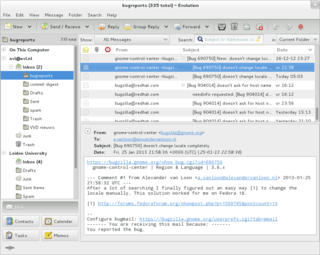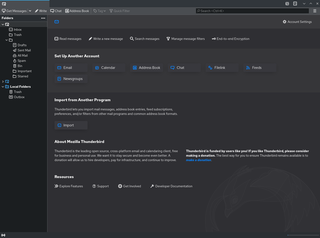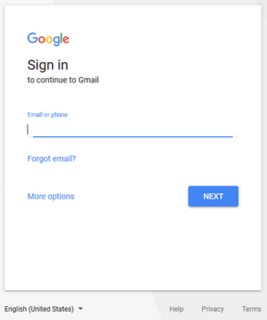
Electronic mail is a method of exchanging messages ("mail") between people using electronic devices. Email was thus conceived as the electronic (digital) version of, or counterpart to, mail, at a time when "mail" meant only physical mail. Email later became a ubiquitous communication medium, to the point that in current use, an e-mail address is often treated as a basic and necessary part of many processes in business, commerce, government, education, entertainment, and other spheres of daily life in most countries. Email is the medium, and each message sent therewith is called an email.

An email client, email reader or, more formally, message user agent (MUA) or mail user agent is a computer program used to access and manage a user's email.
An electronic mailing list or email list is a special use of email that allows for widespread distribution of information to many Internet users. It is similar to a traditional mailing list – a list of names and addresses – as might be kept by an organization for sending publications to its members or customers, but typically refers to four things:
A mailing list is a collection of names and addresses used by an individual or an organization to send material to multiple recipients. The term is often extended to include the people subscribed to such a list, so the group of subscribers is referred to as "the mailing list", or simply "the list".

GNU Mailman is a computer software application from the GNU Project for managing electronic mailing lists. Mailman is coded primarily in Python and currently maintained by Abhilash Raj. Mailman is free software, licensed under the GNU General Public License.
Various anti-spam techniques are used to prevent email spam.

Email spam, also referred to as junk email or simply spam, is unsolicited messages sent in bulk by email (spamming).
The term Listserv has been used to refer to electronic mailing list software applications in general, but is more properly applied to a few early instances of such software, which allows a sender to send one email to a list, which then transparently sends it on to the addresses of the subscribers to the list.
An autoresponder is a computer program that automatically answers e-mail sent to it. They can be very simple or quite complex.
Email marketing is the act of sending a commercial message, typically to a group of people, using email. In its broadest sense, every email sent to a potential or current customer could be considered email marketing. It involves using email to send advertisements, request business, or solicit sales or donations. Email marketing strategies commonly seek to achieve one or more of three primary objectives, to build loyalty, trust, or brand awareness. The term usually refers to sending email messages with the purpose of enhancing a merchant's relationship with current or previous customers, encouraging customer loyalty and repeat business, acquiring new customers or convincing current customers to purchase something immediately, and sharing third-party ads.

Kontact is a personal information manager and groupware software suite developed by KDE. It supports calendars, contacts, notes, to-do lists, news, and email. It offers a number of inter-changeable graphical UIs all built on top of a common core.
ezmlm is mailing list management software (MLM) by Daniel J. Bernstein. It is similar to GNU Mailman and Majordomo but only works with the qmail mail transfer agent. It is released into the public domain. The latest version, 0.53, came out in 1997.
Email harvesting or scraping is the process of obtaining lists of email addresses using various methods. Typically these are then used for bulk email or spam.
Majordomo is a mailing list manager (MLM) developed by Brent Chapman. It is written in Perl and works in conjunction with sendmail on UNIX and related operating systems. The name majordomo is derived from the Latin "major domus" meaning "master of the house"; in English, the word is used to refer to a large household's chief servant.
Opt-in email is a term used when someone is not initially added to an emailing list and is instead given the option to join the emailing list. Typically, this is some sort of mailing list, newsletter, or advertising. Opt-out emails do not ask for permission to send emails, these emails are typically criticized as unsolicited bulk emails, better known as spam.
Internet fax, e-fax, or online fax is the use of the internet and internet protocols to send a fax (facsimile), rather than using a standard telephone connection and a fax machine. A distinguishing feature of Internet fax, compared to other Internet communications such as email, is the ability to exchange fax messages with traditional telephone-based fax machines.
On Internet usage, an email bomb is a form of net abuse that sends large volumes of email to an address to overflow the mailbox, overwhelm the server where the email address is hosted in a denial-of-service attack or as a smoke screen to distract the attention from important email messages indicating a security breach.

The Gmail interface makes Gmail unique amongst webmail systems for several reasons. Most evident to users are its search-oriented features and means of managing e-mail in a "conversation view" that is similar to an Internet forum.

phpList is an open source software for managing mailing lists. It is designed for the dissemination of information, such as newsletters, news, advertising to list of subscribers. It is written in PHP and uses a MySQL database to store the information. phpList is free and open-source software subject to the terms of the Affero General Public License (AGPL).
People tend to be much less bothered by spam slipping through filters into their mail box, than having desired e-mail ("ham") blocked. Trying to balance false negatives vs false positives is critical for a successful anti-spam system. As servers are not able to block all spam there are some tools for individual users to help control over this balance.






